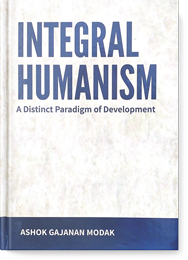Integral Humanism
Author : Ashok Gajanan Modak
Publisher: Shipra Publications
Publication Year : 2023
Price : 1250
About the Book
Integral Humanism: A Distinct Paradigm of Development is a bunch of essays. Barring the first essay on the life and mission of Deendayal Upadhyay, other write-ups can be classified in certain groups. If the first group comprises papers which compare Deendayal Upadhyay with Mahatma Gandhi, Dr. Ram Manohar Lohia and Dr. Ambedkar, the second group elaborates how Pandit Deendayal Upadhyay took inspiration from Swami Vivekananda and Lokmanya Tilak. The third essay of the group compares and contrasts between Integral Humanism and Marxism. The last group of essays comprises papers which highlight certain themes such as Uniqueness of Integral Humanism, Contemporary World Challenges and Integral Humanism as well as Integral Humanism- A Timely Treatise.
About the Author
Prof. Ashok Gajanan Modak is Chancellor, Guru Ghasidas Central University, Bilaspur, Chhattisgarh. Having done M.A first in Economics and later in Political Science, he did his Ph.D. in Soviet studies. Subsequently, he became Reader in the Centre for Soviet Studies of Mumbai University. From 1994 to 2006, Prof. Modak worked as Member of Legislative Council of Maharashtra. After the expiry of his membership of Legislative Council, University of Mumbai invited him to be an Adjunct Professor in the Centre for Central Eurasian Studies. From 2015 to 2020, the Government of India offered him national research professorship. Recipient of several awards including Best Parliamentarian Award, Prof. Modak has written 38 books and more than 200 research papers. He has do research in New Delhi, Moscow, The Hague, London and Dubrovnik in former Yugoslavia.
| Contents | |
|---|---|
| Acknowledgement | |
| 1. | Introduction Pandit Deendayal’s India-Centric Approach vs Mainstream Mania for Euro-centric Thinking; Global Obeisance to Indian Philosophy; Major Blocks to Our Healthy March; Succinct Introduction |
| 2. | Life and Mission of Pandit Deendayal Upadhaya Pandit Deendayal Upadhyay as the R.S.S. Pracharak; Economic Policy of Jana Sangh; Pandit Deendayal Upadhyay: Builder of Bharatiya Jana Sangh; Akhand Bharat; Pandit Deendayal Upadhyay: Inimitable Ideal Organiser; Pandit Deendayal Upadhyay and Organisation of Political Democracy |
| Part – I | |
| 3. | Pandit Deendayal Upadhyay and Mahatma Gandhi Assessment of the Critique of the Presidential Remark; Striking Similarities and Commonalities; Holistic Indian Culture; Present relevance of Deendayal and Gandhi; Role of Culture in the Development Process; Global Endorsement of Symbiotic Relationship; Eco-Destructive Consumerism; The debt we owe to Deendayal and Gandhi; Elite Sponsored Line of Thinking during Immediate Post Freedom Years in India |
| 4. | Pandit Deendayal and Dr. Ambedkar: Two Architects of Modern India The Rationale behind this Essay; Dr. Ambedkar’s Legacy; Ideal Social Order; Inclusive Discourse of the Emancipation of Dalits ; Reliance on the Institution of Dharma; Faith in the Psychological Transformation of Society; Deendayal Upadhyay's Life- Mission and Vision; Pandit Deendayal’s Pursuit of Justice and Equality; Notable Commonalities Between Pandit Deendayal and Ambedkar; Policies and Practices of the Narendra Modi Government; Modi-Government’s Success in Assimilating Muslim; Overall Assessment of the Government-Performance; Modi-Government’s Unique Decisions and Schemes; Pursuit of Social Justice |
| 5. | Pandit Deendayal Upadhyay and Ram Manohar Lohia |
| Part – II | |
| 6. | Integral Humanism: Unfoldment of Vivekananda’s Vision |
| 7. | Integral Humanism: A Quest for Swaraj in Ideas Indian Political Scenario of Immediate Post-freedom Years; Genesis and Growth of European Doctrines; Let Indian Culture Shape our Development Path; Indigenous Development Trajectory; Man’s Place in the Economy |
| 8. | Gita-Rahasya: A Fountainhead of Integral Humanism Survey of Pandit Deendayal’s Essays on Tilak; Tilak’s Exposition of Gita-Dharma; Tilak’s Disquisition and its Impact on Pandit Deendayal; Tilak’s Legacy and Integral Humanism |
| Part – III | |
| 9. | Integral Humanism and Marxism: Commonalities and Contrasts Background; Circumstances that Shaped Integral Humanism; Circumstances Shaping Marxism; Commonalities Between Integral Humanism and Marxism; Contrasts Between Integral Humanism and Marxism |
| 10. | Integral Humanism and Sustainable Development Goals The Proud Inheritor of Indian Thinkers; Aim of Integral Humanism; UN Development Paradigm; Poverty-Environment Nexus ; Caring for Future Generations; Relationship between HDR and Integral Humanism; Indian Initiatives |
| Part- IV | |
| 11. | Uniqueness of Integral Humanism Positive or Constructive Outlook ; Spiritual Tune; Integral Approach; Holistic Paradigm; Emphasis on Psychological Transformation; Reliance on ‘As Well As Ism’ in the Place of ‘Either Or Ism’; Implementation of Integral Humanism in Indian Economy |
| 12. | Indian Nationalism from the Perspective of Integral Humanism Unique Peculiarities of Indian Nation; Geo-Cultural Nationalism of India ; What is Dharma? ; Attributes of Indian Nationalism ; Hinduism and Indian Nationalism ; Relevance of Indian Nationalism |
| 13. | Contemporary World: Challenges and Integral Humanism Present World Challenges; Divine Tendencies of the Architects of Modern India; USP’s (Unique Selling Points) of Integral Humanism; World Acclaim of Integral Humanism; Unintentional Global Support to Integral Humanism |
| 14. | Integral Humanism: A Timely Treatise Introduction ; Elaboration of events Pertaining to Integral Humanism; Pandit Deendayal’s Vision: India-Centric Approach; Spiritual Tune; Reliance on Dharma; Constructive or Positive Perspective; Cosmo-Centric Viewpoint; Distinct Outlook about ‘State’; Integral Humanism and ‘Nation’; Do we not remember here Pandit Deendayal’s elucidation of ‘Chiti’? |
